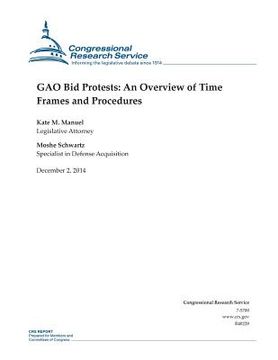Reseña del libro "GAO Bid Protests: An Overview of Time Frames and Procedures (en Inglés)"
For purposes of federal law, a bid protest involves a written objection to the conduct of government agencies in acquiring supplies and services for their direct use or benefit. Such conduct can include (1) soliciting or otherwise requesting offers; (2) cancelling such solicitations or requests; (3) awarding or proposing to award a contract; (4) terminating or cancelling a contract due to improprieties involving its award; or (5) converting functions performed by government employees to private sector performance. Bid protests are of perennial interest to Congress, in part, because of the effects of protests on agency missions and operations. Congressional interest can also be prompted by notable protests (e.g., SpaceX's recent protest of contracts for launch services), as well as by agency determinations not to follow any nonbinding recommendations made by the Government Accountability Office (GAO) in deciding protests. GAO is not the only forum with authority to hear bid protests involving federal acquisitions. The procuring agency and the U.S. Court of Federal Claims can also hear bid protests. However, GAO hears more protests than the Court of Federal Claims, the only other forum for which data are readily available. Thus, its protest procedures-which can differ somewhat from those of the procuring agencies and the Court of Federal Claims-are the focus of this report. Legislation and regulations establish what issues may be protested with GAO and who may bring a protest. As previously noted, by statute, GAO may hear complaints alleging violations of federal procurement law in federal acquisitions. However, it is expressly barred by regulation from hearing certain issues, such as challenges to small business size certifications. Any interested party-an actual or prospective bidder or offeror whose direct economic interest would be affected by the award of, or failure to award, a contract-may file a protest. GAO is required by statute to provide for the "inexpensive and expeditious" resolution of protests, "[t]o the maximum extent practicable." Its practices permit "inexpensive" resolution, in part, by enabling interested parties to represent themselves, rather than rely on attorneys. For example, GAO does not require "formal briefs" or "other technical forms" of pleadings or motions. It is also subject to statutory mandates that promote "expeditious" resolution, in part, by requiring GAO to issue final decisions within 65 to 100 days after the protest was filed. Filing a GAO protest may trigger an automatic stay of contract award or performance that lasts for the duration of the protest. Such automatic stays are unique to bid protests filed with GAO and help account for GAO's popularity as a protest forum. Agencies may, however, override these stays upon determining that urgent and compelling circumstances will not permit waiting for GAO's decision, or performance of the contract is in the best interests of the United States. GAO may dismiss, deny, or sustain a protest. When a protest is dismissed or denied, the procuring agency may generally proceed with the challenged action. In contrast, when a protest is sustained, GAO may recommend specific actions (e.g., amending the solicitation, reevaluating proposals). Such recommendations are not legally binding because the separation of powers doctrine precludes legislative branch agencies, such as GAO, from controlling the actions of executive branch agencies. However, the agency is required by statute to notify GAO if GAO's recommendations are not fully implemented, and GAO, in turn, must notify Congress.

